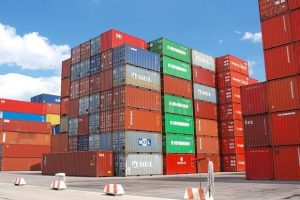
There is little room for error when loading a shipping container; each row must be loaded calmly and carefully. The average shipping container will fit approximately 45-47 bales loaded length-wise, totaling seven rows. It’s important to ensure you have five more bales than you need just in case. If a bale breaks, get it out of the way and start again with another bale. However, if the bale breaks in the container throw as much of the bale as possible in whatever space is available on the row. Depending on the size, there can be six bales (1000-1100 lbs) or seven small to average bales (900-970 lbs). The dimensions of a large bale are typically 60x30x48. The weight varies according to the compression force of the baler, but the usual weight is around 1,000 lbs with newer balers producing bales weighing 1,200 to 1,400 lbs.
In order to load a container you’ll need a vertical baler. Vertical balers can have two different hydraulic cylinders, 48 inches or 54 inches long. When choosing a baler make sure it has a 54 inch cylinder; this makes more compact bales and they load more easily.
Bales MUST be packed correctly; clothes from drop boxes come loosely and in bags. It helps to have some loose clothes in each bale. For the most part clothes need to be baled tightly and have blankets or burlap material as well as cardboard on the edges. A minimum of five wires must be tied around each bale.
It’s also very valuable to have a good weight scale. A good scale is durable and will last many years. Although relatively expensive, the peace of mind a scale will bring is worth much more than the cost. When you have a scale you can ship with a packing list. Since each bale is individually weighed, you know exactly how much weight is being put in the container and on the truck. This means you can maximize a load’s weight without overloading. Make sure you get your scales calibrated by a scale company and keep the paperwork so you know your scales are legal for trade. An excellent company to do this is Memphis Scale Works in Memphis, Tennessee. Most cities should have a scale company that can do this though. The cost is around $300 to calibrate.
The floor scale is fairly durable; it can typically only be damaged by having something very heavy dropped on it, dropping the scale itself, or hitting it hard with a piece of equipment like a forklift. The scale will be bumped around from time to time when placing bales on it to be weighed, but general use shouldn’t damage it. Keeping a 50 lb metal plate handy is a good idea, so if a bump happens the scale’s accuracy can be checked. Another common problem is forgetting to clean out from under the scale. A piece of wood from a pallet or plastic from a toy is enough to affect a scale’s accuracy.
With these tips in mind, you’re sure to have a simple and efficient loading process. If you have any questions or need logistics help, contact one of our logistics team!







